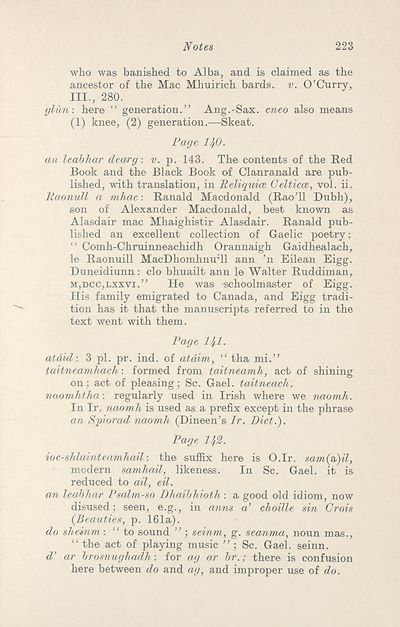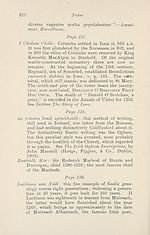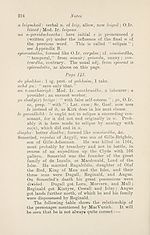Download files
Complete book:
Individual page:
Thumbnail gallery: Grid view | List view

Notes
223
who was banished to Alba, and is claimed as the
ancestor of the Mac Mhuirich bards, v. 0’Curry,
III., 280.
glim: here “ generation.” Ang.-Sax. cneo also means
(1) knee, (2) generation.—Skeat.
Page llfi.
an leabhar dearg -. v. p. 143. The contents of the Red
Book and the Black Book of Clanranald are pub¬
lished, with translation, in Beliquice Gelticce, vol. ii.
Baonull a mhac : Ranald Macdonald (RaoTl Dubh),
son of Alexander Macdonald, best known as
Alasdair mac Mhaighistir Alasdair. Ranald pub¬
lished an excellent collection of Gaelic poetry:
” Comh-Chruinneachidh Orannaigh Gaidhealach,
le Raonuill MacDhomhnu;ll ann ’n Eilean Eigg.
Duneidiunn: clo bhuailt ann le Walter Ruddiman,
m,dcc,lxxvi.” He was 'schoolmaster of Eigg.
His family emigrated to Canada, and Eigg tradi¬
tion has it that the manuscripts referred to in the
text went with them.
Page 1^1.
atdid -. 3 pi. pr. ind. of atdim, “ tha mi.”
taitneamhach: formed from taitneamh, act of shining
on: act of pleasing; Sc. Gael, taitneach.
naomhtha: regularly used in Irish where we naomh.
In Ir. naomh is used as a prefix except in the phrase
an Sqriorad naomh (Dineen’s Ir. Diet.).
Page 1£2.
ioc-shlainteamhail ■. the suffix here is O.Ir. sam(a>)il,
modern samhail, likeness. In Sc. Gael, it is
reduced to ail, eil.
an leabhar Psalm-so Dhaibhioth : a good old idiom, now
disused; seen, e.g., in anns a’ choille sin Crois
{Beauties, p. 161a).
do shehnm : ‘‘to sound ” ; seinm, g. seanma, noun mas.,
‘‘ the act of playing music ” ; Sc. Gael, seinn.
d' ar brosnughadh: for ag ar br.; there is confusion
here between do and ag, and improper use of do.
223
who was banished to Alba, and is claimed as the
ancestor of the Mac Mhuirich bards, v. 0’Curry,
III., 280.
glim: here “ generation.” Ang.-Sax. cneo also means
(1) knee, (2) generation.—Skeat.
Page llfi.
an leabhar dearg -. v. p. 143. The contents of the Red
Book and the Black Book of Clanranald are pub¬
lished, with translation, in Beliquice Gelticce, vol. ii.
Baonull a mhac : Ranald Macdonald (RaoTl Dubh),
son of Alexander Macdonald, best known as
Alasdair mac Mhaighistir Alasdair. Ranald pub¬
lished an excellent collection of Gaelic poetry:
” Comh-Chruinneachidh Orannaigh Gaidhealach,
le Raonuill MacDhomhnu;ll ann ’n Eilean Eigg.
Duneidiunn: clo bhuailt ann le Walter Ruddiman,
m,dcc,lxxvi.” He was 'schoolmaster of Eigg.
His family emigrated to Canada, and Eigg tradi¬
tion has it that the manuscripts referred to in the
text went with them.
Page 1^1.
atdid -. 3 pi. pr. ind. of atdim, “ tha mi.”
taitneamhach: formed from taitneamh, act of shining
on: act of pleasing; Sc. Gael, taitneach.
naomhtha: regularly used in Irish where we naomh.
In Ir. naomh is used as a prefix except in the phrase
an Sqriorad naomh (Dineen’s Ir. Diet.).
Page 1£2.
ioc-shlainteamhail ■. the suffix here is O.Ir. sam(a>)il,
modern samhail, likeness. In Sc. Gael, it is
reduced to ail, eil.
an leabhar Psalm-so Dhaibhioth : a good old idiom, now
disused; seen, e.g., in anns a’ choille sin Crois
{Beauties, p. 161a).
do shehnm : ‘‘to sound ” ; seinm, g. seanma, noun mas.,
‘‘ the act of playing music ” ; Sc. Gael, seinn.
d' ar brosnughadh: for ag ar br.; there is confusion
here between do and ag, and improper use of do.
Set display mode to:
![]() Universal Viewer |
Universal Viewer | ![]() Mirador |
Large image | Transcription
Mirador |
Large image | Transcription
| An Comunn Gàidhealach > An Comunn Gàidhealach Publications > Rosg Gaidhlig > (239) |
|---|
| Permanent URL | https://digital.nls.uk/126280256 |
|---|
| Description | This contains items published by An Comunn, which are not specifically Mòd-related. It includes journals, annual reports and corporate documents, policy statements, educational resources and published plays and literature. It is arranged alphabetically by title. |
|---|
| Description | A collection of over 400 items published by An Comunn Gàidhealach, the organisation which promotes Gaelic language and culture and organises the Royal National Mòd. Dating from 1891 up to the present day, the collection includes journals and newspapers, annual reports, educational materials, national Mòd programmes, published Mòd literature and music. |
|---|---|
| Additional NLS resources: |
|

